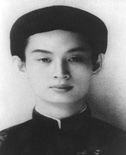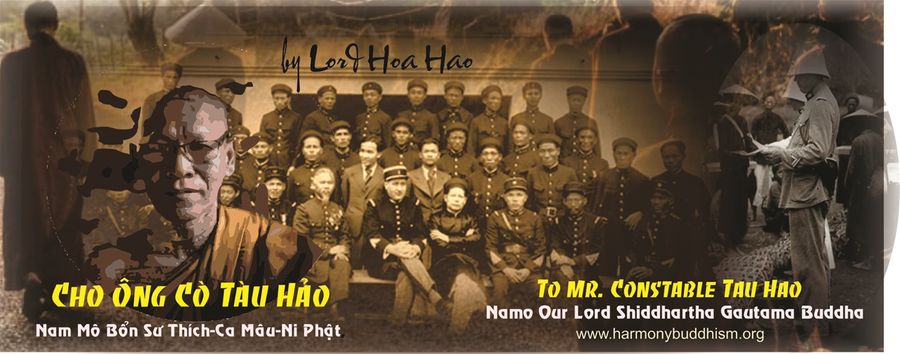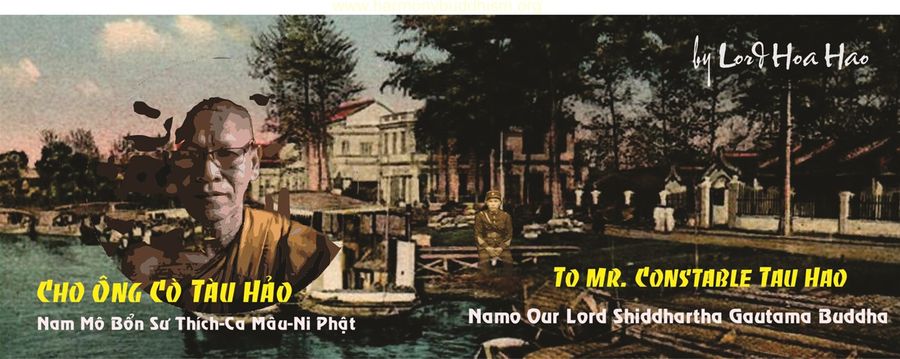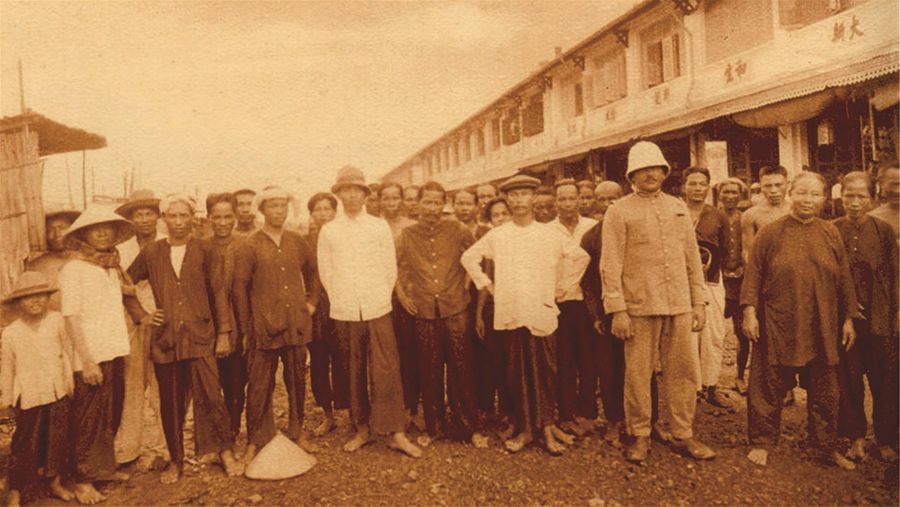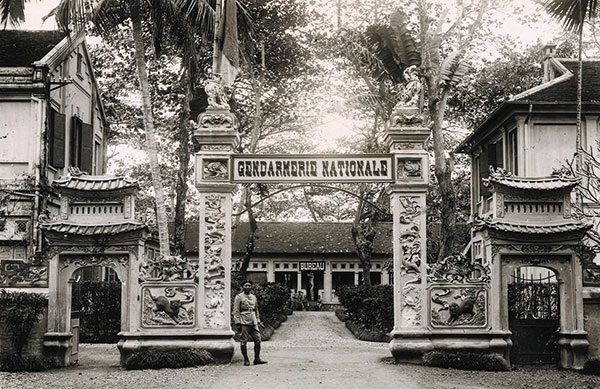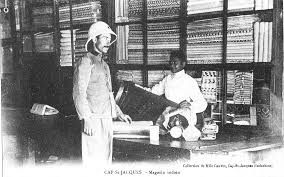PHẬT GIÁO HÒA HẢO
HARMONY BUDDHISM
Cho ông Cò tàu HẢO ở Sài-Gòn
Nam-Mô Bổn-Sư Thích-Ca Mâu-Ni Phật,
----0-----
Cung kính Phật, cung kính Pháp, cung kính Tăng,
Tam-qui ngũ-giái lòng hằng gìn theo.
Chúc ông thoàn nhã vững lèo,
Qua bờ giác-ngạn sớm treo gương mầu.
Nơi cõi tạm sông sầu bể khổ,
Làng ngựa xe cám-dỗ tao-nhân.
Gây ra lắm nợ phong-trần,
Luân-hồi sáu nẻo khôn lần bước ra.
Rày tỉnh-ngộ ái-hà quyết dứt,
Đèn đạo tâm sáng rực soi đường.
Cầu tu cho đạt ngũ-hương,
Huơi gươm trí-huệ Ma-vương hãi-hùng.
Làm cho chúng phục-tùng chơn-lý,
Trong sắc-thân giám-thị lục-căn.
Đừng cho chúng tính lăng-quằng,
Ngoài thì chấp thủ mà ngăn lục-trần.
Phá ngũ-uẩn rứt lần tham ái,
Cội sân si cũng phải tảo-trừ.
Đem về giác-tánh chơn-như,
Kim-thân thị hiện dứt trừ tử sanh.
Đem tâm hồi hướng gốc lành,
Làm tôi Phật-Tổ chí thành, chí chơn.
Dầu mắc phải mưa đơn, gió kép,
Cũng chuyên trì mà dẹp gai chông.
Ngày nào đắc được lục-thông ,
Vớt hồn cha mẹ, Tổ-Tông bảy đời.
Về Cực-Lạc thảnh-thơi an-dưỡng,
Ấy là ngày ban thưởng công tu.
Chúc cho đó vẹt mây mù,
Vững-vàng bất thối, công-phu vuông tròn.
Đến ngày biển cạn non mòn,
Tứ-Ân đã trả chẳng còn tội căn.
Nay ông nhập tự làm Tăng,
Trước sau tuy khác, thiện-căn vẫn đồng.
Lắng tai nghe được tin hồng,
Tờ hoa ít chữ gọi lòng chia vui.
Bạc-Liêu, ngày 25-4 Nhâm-Ngũ (8-6-42).
To Mr. Cons. Tau Hao in Sai Gon
Namo Our Lord Shiddhartha Gautama Buddha
-----0-----
Bow to Buddha, bow to Dharma and Sangha,
Keep Three Jewel refuges and Five Precepts at heart.
May you well tackle your insight boat,
Soon reaching the other bank(1) for an exemplar.
This temporary world is an occeanful of sufferings,
Its luxurious scenes seduce learnt beings.
Inducing them to commit karmas on earth,
So they hardly exit the Six-Path cycle of rebirth.
Now waken, firmly give up all attachments,
You will be led by your moral acumens.
Endeavor to gain the Five Perfumes,
With an insight sword to frighten Devil heirlooms.
To subjugate them to sagacity,
Your six-sense organs must be under scrutiny.
Don't let them go astray,
Stop six-sense objects having their own way.
Destroy five-aggregates and erode desires,
Eliminate the root causes of delusion and ire.
Bring back your True Self, the Awakened,
Your body will be gold permanent.
Gear yourself toward the wholesome root,
As a Buddhist, your devotion must be good.
Even though you incur mishaps,
Patiently get over thorns and booby traps.
The day you acquire six supernatural powers,
You can salvage your parents and all ancestors.
The Pure-Land you ascend is a leisure resort,
This is the day you're rewarded for your effort.
May you be able to split the smog,
Your performance will be perfect and never corrode.
When all seas dry out and all mountains collapse,
You'll have no more sins after paying off Four Debts.
Even though you've now become a monastic,
As before, your goodness root remains static.
Having listened, I know this is a good news,
On a floral paper, I wish to share your beatitude.
Bac-Lieu, on 25 April 1942
5.-Lục Thông: Abhijna or Sadabhijna (skt)—Sáu thần thông mà chư Phật hay chư A La Hán đạt được qua tứ thiền—Six miraculous or transcendental powers—Six magical penetrations—Six superknowledges—Six supernatural or universal powers acquired by a Buddha, also by an arhat through the fourth degree of dhyana:
1) Thiên Nhãn Thông: Divyacaksus (skt)— Ability to see all forms—Clairvoyance—Deva-eye—Deva-vision—Divine sight—Penetration of the Heavenly Eye—Khả năng thấy được tất cả mọi thứ trong sắc giới. Khả năng thấy cái mà mình muốn thấy—Instantaneous view of anything anywhere in the form realm. Power to see what one wills to see anywhere.
2) Thiên Nhĩ Thông: Divyasrotra (skt)— Clairaudience—Deva-Ear—Divine hearing—Penetration of the Heavenly Ear—Khả năng nghe mọi âm thanh. Khả năng nghe và hiểu mọi ngôn ngữ—Ability to hear all sounds (ability to hear any sound anywhere). Power to hear and understand all languages.
3) Tha Tâm Thông: Paracitta-jnana (skt)— Mental telepathy—Tha Tâm Trí Thông hay khả năng đọc được tư tưởng của người khác mà các bậc giác ngộ đạt được cao hay thấp tùy theo sự thành đạt của bậc ấy—Penetration into others’ minds or thoughts—Ability to know the thoughts of others or power to read thoughts, or knowledge of the minds of all living beings—Ability (power) to know the thoughts of all other minds which enlightened beings have to a greater or lesser extent depending on their spiritual achievements.
4) Thần Túc Thông: Rddhi-saksatkriya-jnana (skt)—Penetration of spiritual fulfillment (fulfillment of the spirit)—Psychic travel—Khả năng đi bất cứ đâu và làm bất cứ thứ gì tùy ý—Ability (power) to be anywhere and to do anything at will, or power to appear at will in any place and to have absolute freedom to do anything.
5) Túc Mạng Thông: Purvanivasanusmrti-jnana (skt)—Khả năng biết được quá khứ vị lai của mình và người—Knowledge of past and future of self and others or ability to penetrate into past and future lives of self and others (knowledge of all forms of former existences of self and others).
6) Lậu Tận Thông: Asravaksaya-jnana (skt)—Ability to end contamination—Power to deliver of the mind from all passions—Penetration of the exhaustion (extinction) of outflows—Khả năng chấm dứt nhiễm trược và đưa tâm đến chỗ giải thoát khỏi mọi dục vọng—Supernatural consciousness of the waning of vicious propensities, and the deliverance of mind from passions, or insight into the ending of the stream of transmigration.
6. Bạc Liêu is a provincial city and capital of the Bạc Liêu Province in the Mekong Delta region in southern Vietnam. It is a medium-sized town with a population of approximately 150,000. The former name of the city is Vĩnh Lợi
Source: Oracles and Poems the Fourth Edition, 2019 (page 402)
1.-According to Mr. Vinh Binh on 21 Marh 2014, in the youtube article, he was not sure what Ong Co Tau Hao's practice level is for Lord the Master to offer this poem to him before being ordained. His full name is Trần-Quang-Hảo, his wife is Mr Cò Hảo Phùng-Thị-Liên. His son, Tran Quang Hanh is the son-in-law of Mr. Vo Van Gioi, nicknamed ‘Ky Gioi’. Based on his title 'Cò', he should be a senior policeman (commissaire) who kept watch over a port at Saigon under the French government, that’s why people called him Ông Cò Tàu Hảo.
Once upon a time, in a conversation, Mr. Ky Gioi’s son-in-law told the narrator that, when Lord the Master was in Bac Lieu, he was only 6 years old and Tan was 8 years old. He told the Lord that his memory was so poor that he had his hands beaten every day and, each time he went home, he sobbed. One day, on the way home, he met the Lord who asked him to show his left hand. This hand was still red as it had just been beaten. Seeing it, the Lord spits saliva on Tan’s palm and used his thumb to rub it, saying that, after Tan went back to school, whatever he learnt he remembered it. Since then, Tan always stood on top of his school. When he almost reached the doctorate of medicine, Ong Co Tau Hao left his home ordained and left him with the four hectares of garden. Each time he attended the graduation exam, he sold a hectare. However, he always failed even though he has sold out all four hectares. He said that the Lord said very accurately I never became a doctor. At first, he said that the Lord would have told me a joke. Later, he realized that he tried his best but to no avail. He returned home and became a herbalist. Querying about Ong Co Tau Hao, he said, the latter had gone without any trace. He himself stayed home with his mother, Mrs Phung Thi Lien, and never saw Ong Co Tau Hao again. In fact, Mr. Co did not say where he intended, even his son did not know. This has proven that Ong Co Tau would have had a great root as a cultivator. Binh never saw him for a consecutive thirty years without returning. And we don't know his whereabouts. The tales of his children and grand children also suit this assumption.
According to Lê Minh (Nguyễn Thế Truyền): In June 1942, when the French colonial government wanted to liquidate Lord the Prophet, they took him to Saigon, before sending him to Cambodia and Laos to separate him from his following. They decided to do so because they were afraid that, with his influence growing every day, he became a threat to their power. Ong Co Tau Hao helped him escape owing to his knowledge of the inner working of the French government. He took him to Mr. Ky Gioi's at Bac Lieu.
According to Mr. Nguyen Thanh Giau, a senior Hoa Hao Buddhist in California, Co Tau Hao might be one of the ferry fare officers under the French colonial rule, in charge of checking fares for passengers. Under the French rule, the "Co" position was rather influential as it was equivalent to that of a Senior Police Officer. Mr. Co Tau Hao was the in-law of Mr. Ky Gioi, therefore he often visited the latter, on each occasion he might have often seen the Lord. It is said that he very much deeply admired the Lord. One day he decided to be ordained and, when the latter has known it, this, the Lord gave him a poem.
2.-Take refuge in the Three Jewels, Buddha, Dharma and Sangha.
3.-Ngũ Hương (Five Perfumes) Ngũ phần hương—Lấy năm thứ hương ví với ngũ phần pháp thân—Five kinds of Perfume—The five attributes of dharmakaya or spiritual body of the Tathagata—Five kinds of perfume or fragrance, corresponding with the five kinds of dharmakaya: Giới hương: (戒香) The dharmakaya is above all moral conditions. Định hương: (定香)The dharmakaya is tranquil and apart from all false ideas. Huệ hương: (慧香)The dharmakaya is wise and omniscient. Giải thoát hương(解脱香): The dharmakaya is free, unlimited, unconditioned, which is the state of nirvana. Giải thoát tri kiến hương(解脱知见香): The dharmakaya has perfect knowledge. http://tuvienquangduc.com.au/tudien/tdphathoc/tdphthienphucVA-ng.html
4.-Ngũ uẩn: Pancaskandha (S). The five skandhas, the five cumulations, substances, or aggregates, five groups of clinging i.e. the components of an intelligent being especially a human being: (1) Sắc uẩn, rùpa, the corporeal group; (2) Thụ uẩn, vedanà, the feeling group; (3) Tưởng uẩn, sanjnà, the perception group; (4) Hành uẩn, samskàra, the mental formation group; (5) Thức uẩn, vijnàna, the consciousness group. (http://tuvienquangduc.com.au/tudien/tudien-n.html)
Bac Lieu
The Indian merchant sells their material and was visited by a French officer.
